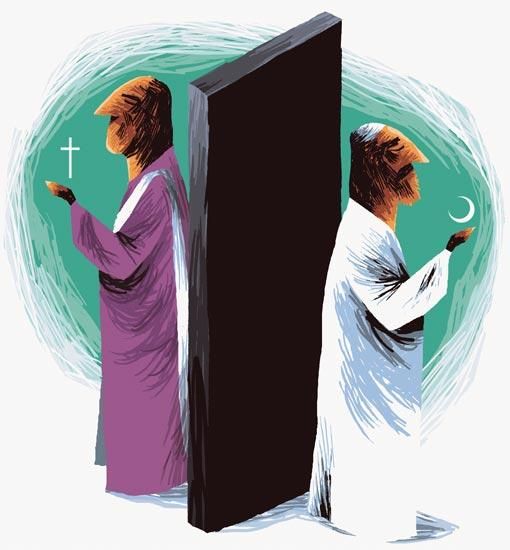This is the last of five excerpts published by Gulf News of the largest ever opinion survey of the world's Muslims. Who speaks for Islam? by John Esposito and Dalia Mogahed was published by Gallup Press.
While Gallup data indicate that faith is not the distinguishing factor primarily responsible for extremism, Islam does remain a significant source of religious, historical, national, and cultural identity. Thus, Islam remains in the spotlight. As noted previously, secular and religious rulers and reform and opposition movements (mainstream and extremist) have used religion to legitimate, recruit, mobilise, and motivate. Just as religion remains part of the fabric of Muslim societies, so too it remains a potent force in political and social change.
As we have seen, both our data and Muslim politics demonstrate a broad-based desire for greater political participation, democratisation, government accountability, and the rule of law. However, a major concern in the region is that the West is not really interested in Muslim self-determination, but instead desires to bolster authoritarian regimes and promote its own brand of democratic governance. In the short run, real self determination will require engaging religious political parties and leaders who would be democratically elected if free and fair elections were held in many countries today. Many will be more independent and disagree with some US policies.
However, allowing people to make change peacefully and air their grievances freely will diminish the allure of those who advocate violence as the only means available. Moreover, opening up the political system in countries where strong political parties have not been permitted will also provide non-Islamist alternatives.
Diagnosing terrorism as a symptom and Islam as the problem, though popular in some circles, is flawed and has serious risks with dangerous repercussions. It confirms radical beliefs and fears, alienates the moderate Muslim majority, and reinforces a belief that the war against global terrorism is really a war against Islam.
Whether one is radical or moderate, this negative attitude is a widespread perception.
Muslims say that they admire Western technology and liberty most of all, and then go on to say that they associate these qualities most not with France, Japan, or Germany, but with the United States.
It is precisely because the West in general, and the United States in particular, is seen as having "a fair judicial system," as giving its "own citizens many liberties," and portraying itself as a champion of human rights that US actions toward Muslims, such as those at Guantanamo, Abu Ghraib, and other abuses are seen as so hypocritical.
One US diplomat who was in Egypt when the Abu Ghraib scandal broke out said she was told by the locals: "We would expect this from our own government, but not from you."
Ironically, it may be because of America's idealised image as a beacon for democracy in the Muslim world that its actions elicit such passionate anger. The perception is: for you, America, to go against your own values and how you would treat your own people and to abuse Muslims in this way means you must really despise us and our faith.
Avoiding or ending acute conflicts in the Muslim world is more effective than projecting a strong military presence to safeguard American interests and limit the growth of global terrorism.
The argument that a strong military presence in the region will win the war against terrorism is not borne out by Gallup data from across the Muslim world. The long war against terror will not be won on the battlefield, but by winning the loyalty of the people in the region.
While terrorists must be fought aggressively, military occupation of Muslim lands increases anti-American sentiment, diminishes American moral authority with allies, and silences the voices of moderates who want better relations.
In the end, ongoing conflict between the West and the Muslim world is not inevitable. It is about policy, not a clash of principles.
Polls found that Lebanese hold Christians and Muslims in high regard (more than 90 per cent have favourable opinions of each) despite a decades-long civil war in Lebanon fought roughly along confessional lines.
Today, less than a generation after the civil rights struggle, a majority of blacks and whites in America say that relations between their groups are good. These hopeful examples underscore the possibility of improving relations between groups - even those whose conflicts lasted centuries - and the relative speed by which this is possible when there is a greater understanding of the conflict's root cause.
*******
The real war is one of perceptions
As our data have demonstrated, the primary cause of broadbased anger and anti-Americanism is not a clash of civilisations but the perceived effect of United States foreign policy in the Muslim world. Nor is there a blind hatred of the West.
- Muslim opinion distinguishes between Western nations and between their leaders: America/Bush and Britain/Blair vs France/Chirac and Germany (Blair and Chirac were still in office when Gallup conducted this poll).
- Unfavourable opinions of Britain and the United States contrast sharply with more positive opinions of France and Germany. Across all predominantly Muslim countries polled, an average of 75 per cent of respondents associate "ruthless" with the United States (in contrast to only 13 per cent for France and 13 per cent for Germany).
- Western European nations share Muslim opinions about the United States.
Thus, we need to disaggregate "the West" and the "Muslim world" into individual, distinct countries whose confrontations and conflicts are attributable to specific policies of specific nations and their leaders, especially the United States.
While knowing more about Muslims makes Americans more likely to hold positive views about them, the exact opposite trend exists among Muslims with regard to their opinion of the United States government. The closer that respondents follow news about issues related to US foreign policy, the more likely they are to hold negative opinions of the United States government.
Some in the West counsel that Islam is the problem and that the West needs to fight it or create a "moderate Islam" to defeat anti-Americanism, overcome resistance to modernisation, and promote democracy and human rights.
This rhetoric alienates the very Muslim majorities that are Western allies in the fight against religious extremism and global terrorism. This approach can result in unwise foreign policies: support for secular authoritarian leaders and regimes that suppress all opposition, including mainstream secular leaders and "Muslim democrats"; the marginalisation of mainstream Islamic parties that function within society; and a "shock and awe" military policy to promote democracy.
It also results in domestic policies that compromise civil liberties: indiscriminate profiling and arrest of Muslims, monitoring of mosques and closure of religious institutions. The net result is to convince many Muslims that the West is waging a war against Islam and Muslims. The problem is not Islam any more than Christianity or Judaism is the cause of its extremists and terrorists; it's the political radicalisation of religion that creates militant theologies.
Islam may be a powerful weapon for discrediting terrorists and limiting the growth of terrorism. For example, in Indonesia, those who say that the 9/11 attacks were unjustified support this response by citing religious principles ("It is against God's law," "God hates murder," or "It is against Islam") as well as humanitarian ones (the loss of human life was tragic, and so forth), while those who say that 9/11 was justified cite political grievances to support their response, not religious justifications.
Identity
For overwhelming majorities of Muslims (who are also the moderates), Islam is a fundamental source of identity, guidance and spiritual and psychological security. Mainstream Muslims, who have been the primary victims of terrorism, are as concerned about extremism, violence, and terror as are Westerners.
They, even more than Westerners, believe that they are responsible for fighting extremism and for modernising their societies. Respecting Islam will encourage the moderate majority to use their authentic interpretation and engagement of religion to disarm the extremists by using the Quran's principles against terrorism.
Regarding religion as the primary problem weakens the positive power of religion and culture and obscures our common values and shared concerns. This fear of Islam leads to the belief in a monolithic Islamic threat that requires massive Western political and military power. Our over-reliance on military solutions is then seen by many Muslims not as an effort to liberate and democratise, but to occupy and dominate - in essence, to "redraw the map of the Middle East and Muslim world."
The perception of United States policy as a form of American neocolonialism - what a prominent group of neoconservatives has called the creation of a New American Century - fuels anti-Americanism globally in the Muslim world and beyond and is used by terrorists as they appeal to new recruits. It also diminishes American moral authority in the Muslim world, Europe and other parts of the world.
Lastly, it silences the voices of moderate Muslims who advocate better relations with the United States.
The Gallup World Poll consistently confirms that the crucial issues in improving relations are the beliefs and perceptions of "the other," which affect and need to inform foreign policies. The war against global terrorism has been fought on three major fronts: military, economic and diplomatic. As military experts have noted, while the military can capture and kill terrorists, it is not equipped to win the struggle for minds and hearts.
This, many today would argue, requires a public diplomacy that addresses the ideological dimensions of war: the war of ideas and the foreign policies created.
Government agencies, think tanks, and the military - all of which in the past had ignored the relationship of religion to politics and international affairs - now have special units of experts, conferences, workshops, and curricula focusing on Islam and Muslim politics and culture.
Government leaders and politicians use and abuse religion in domestic and international politics, too often talking about and for Muslims who have not been heard.
Few are able to base their conclusions on datadriven analysis that reflects the voices of majorities of Muslims across the world - data that are vital in a campaign of programmes and policies to win hearts and minds.
*******
Mistrust matches lack of knowledge
Unfortunately, Americans' feelings or beliefs about Muslims show little understanding of the diversity in Islam.
- 44 per cent of Americans say Muslims are too extreme in their religious beliefs. Less than half believe that US Muslims are loyal to the United States.
- Nearly one-quarter of Americans, 22 per cent, say they would not want a Muslim as a neighbour. As we have seen, 32 per cent of Americans say they admire nothing about the Muslim world, and 25 per cent admit they simply "don't know."
Even more surprising is Americans' self-reported knowledge of Muslim views did not change from 2002 to 2007 despite (or perhaps because of) the dramatic spike in media coverage of the Muslim world during this time. A majority (57 per cen) say they know either nothing or not much about "the opinions and beliefs of people who live in Muslim countries."
Interestingly, the more Americans report knowing about Muslim countries, the more likely they are to hold positive views of those countries. This same trend is found as it relates to knowing a Muslim: those Americans who know at least one Muslim are more likely to hold positive views of Muslims and Islam. Americans say what they admire least about the Muslim world is extremism, radicalism, lack of openness to others' ideas, and gender inequality.
Muslims show substantial agreement with two of the above concerns - condemning the "radical fringe" and citing lack of openness to others' ideas as what they admire least about their own societies. However, Muslim and American perceptions diverge sharply on the issue of gender inequality among Muslims.
For Muslim women, half of the population polled, this concern is almost absent in criticism of their societies. Blaming Islam for women's mistreatment is a losing strategy that alienates those who would otherwise support an end to violence and women's oppression and empowers those who oppose women's rights in the name of defending Islam against a West who hates and wants to destroy the faith.
*******
Muslims and West not monoliths
At the heart of the problem is the tendency to believe that a monolithic West - a coherent unit defined by democracy, human rights, gender equality, and the division of church and state (secularism) - is pitted against a monolithic Muslim world that has sharply different values and aspirations that are incompatible with "Western" values.Western countries exhibit great diversity. The robust presence and role of religion in the US differs significantly from the decline of religion in Europe in countries such as Britain, France, and Germany or the Scandinavian countries.
US separation of church and state contrasts with Britain, Germany, and Norway, which still have state religions and/or state support for religious institutions. Ironically, American publics are much more religious than European publics (68 per cent of Americans vs 28 per cent of Britons, for example, say that religion is an important part of their lives). At the same time, in the United States, where church and state are separated by law, a majority says it favours the Bible as "a source" of legislation (55 per cent) - of that, 9 per cent say it should be "the only source."
Other significant differences are evident in the broad disagreement among European nations about going to war in Iraq. US and British military engagement sharply contrasts with major allies such as France and Germany, who were not supportive, and Spain and Italy, who were initially supportive but then bent to pressure from their majorities and pulled out of Iraq. Finally, Western European nations share most of the Muslim world's negative opinion of US leadership: 68 per cent of Germans, 67 per cent of French, and even 52 per cent of Britons disapprove of US leadership, as do 62 per cent of Jordanians and 53 per cent of Turks.
There is also wide diversity among Muslim nations - politically, economically, culturally, and religiously. As discussed earlier, oil-rich and rapidly developing Gulf states such as Qatar, the United Arab Emirates and Saudi Arabia hardly resemble poor, struggling, underdeveloped countries such as Mali and Yemen.
Islamic republics such as Iran contrast sharply with the more secular-oriented governments of Egypt and Syria. Arab and Muslim nations have a history of rivalry and conflict: Saddam's Iraq versus Iran, Iraq versus Kuwait, and Egypt versus Sudan. We also forget the vast cultural differences among Muslims: less than a quarter are Arab; the majority of Muslims are Asian or African. Finally, significant religious differences exist between Sunnis and Shias who, despite their common Islamic faith, have critical theological and political differences and religious orientations that range from ultra-orthodox to liberal reformers.
The surprising conclusion? Muslims globally, like people of many other faiths, are geographically, racially, linguistically, and culturally diverse. To the further surprise of many, even in terms of some values, Muslims show substantial diversity. For example, only 27 per cent of Jordanians and 33 percent of Saudis say divorce "cannot be morally justified," while 46 per cent of Egyptians and 92 per cent of Bangladeshis assign divorce this label. This difference among Muslims not only illustrates how diverse Muslims are as people with varying cultures and norms, but it also exemplifies the rich diversity within Islam's schools of thought, which hold differing opinions on the issue of divorce.
In contrast to expected differences, the number of commonalities we find between the Muslim world and the West shatters many myths. A significant number of Americans and Muslims believe that religion is or ought to be a pillar of their society, informed and guided by the Bible or Sharia. Majorities of both groups cite the importance of religion in public life and the preservation of family values.
Each group is concerned about its economic future, employment and jobs, and the ability to support its families. Each gives high priority to technology, democracy, the importance of broad political participation, and freedoms of speech and social justice.













